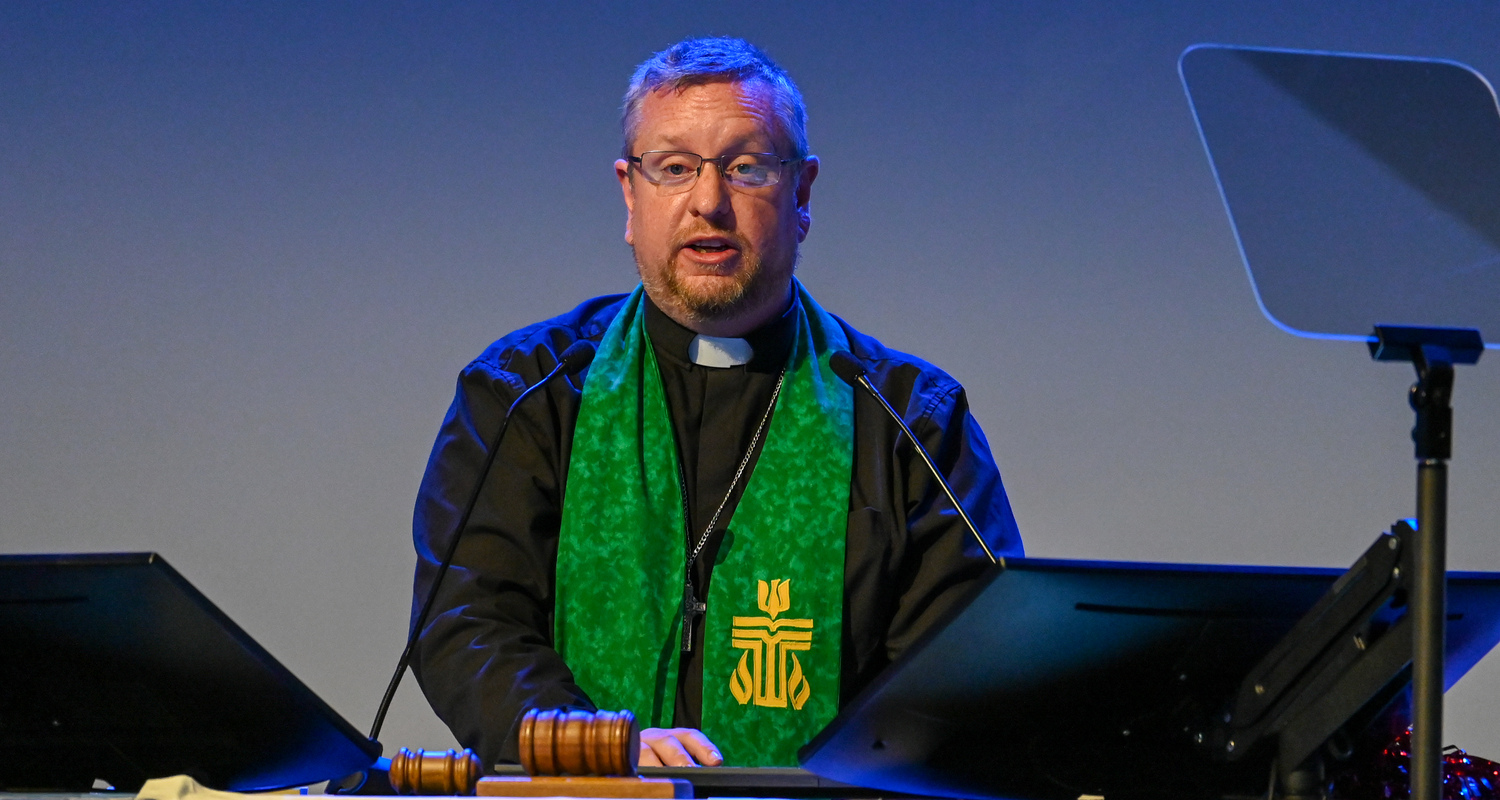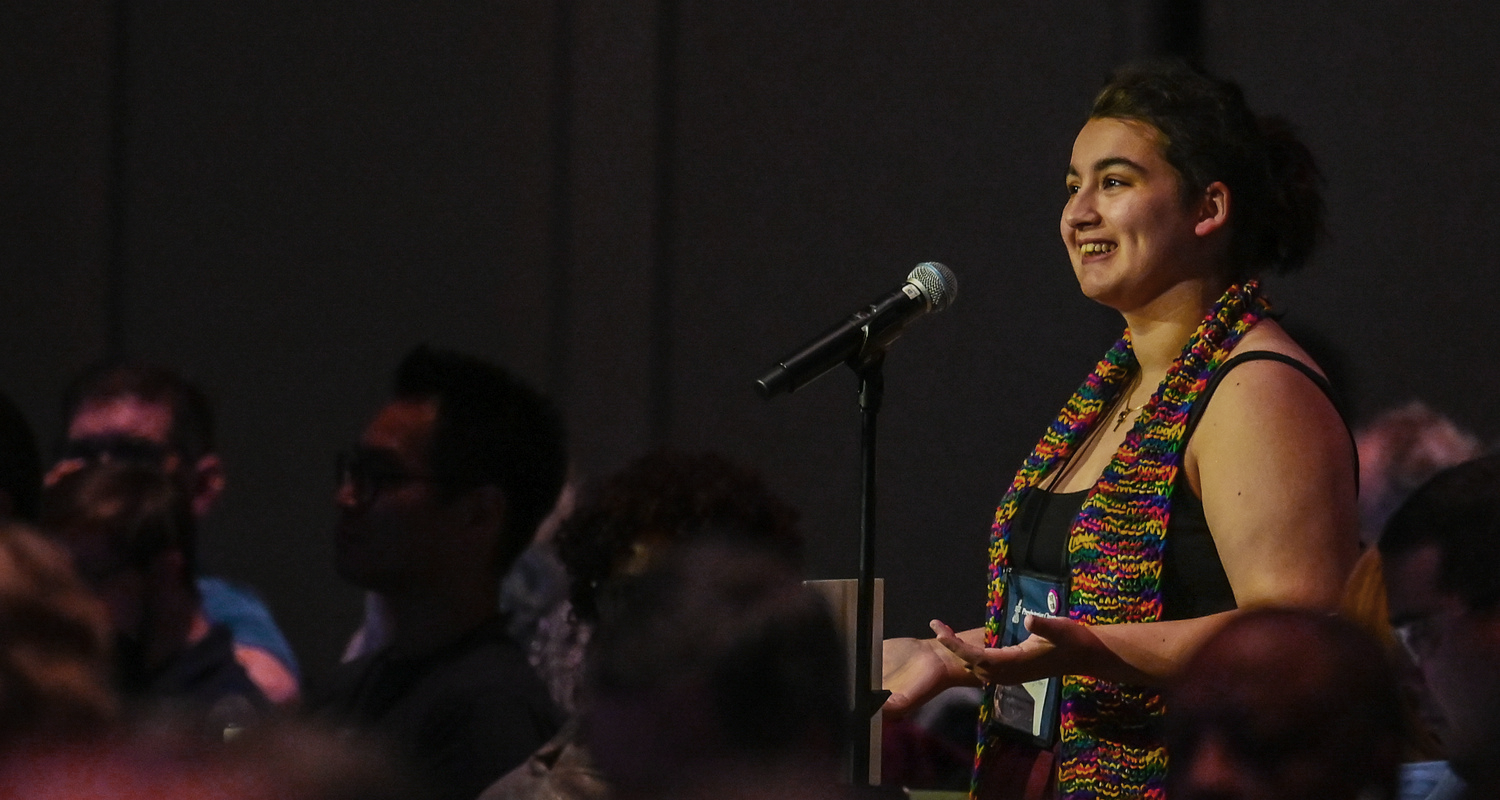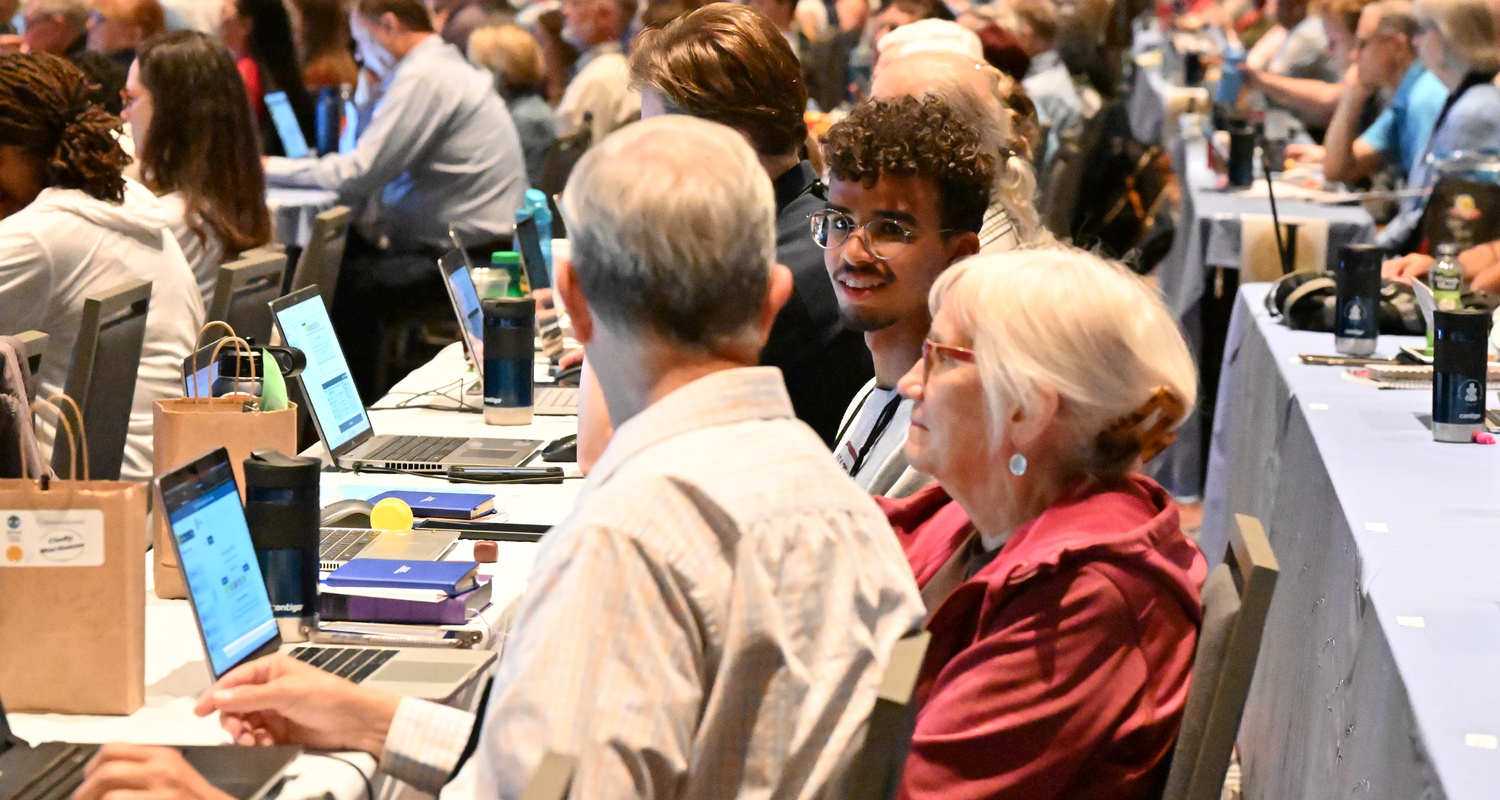
GA226 Co-Moderator Tony Larson guides the Assembly through items of business from the Race, Sexuality, & Gender Justice and Ecumenical & Interfaith Partnership committees during the 6th plenary meeting on July 1, 2024. Photo by Rich Copley.
Monday night’s plenary session opened with an address from Dr. Monica Schaap Pierce, executive director of Christian Churches Together, a fellowship of Christian communions representing 34 denominations and 57 million American Christians, of which the Presbyterian Church (U.S.A.) has been a part since CCT’s founding.
“One of the distinctive features of our fellowship of Christian churches together is our approach of ‘receptive ecumenism,’” said Schaap Pierce. “This feature has created the ideal context for Christians from very diverse communities, often with very different convictions to come together in a unique and holy manner.”
Receptive ecumenism is an understanding and a process that enables unity through an approach of receptivity by being open to receiving the gifts of others.
This spirit of openness to recognizing those who’ve been marginalized and receiving their gifts flowed through the resolutions presented to the assembly by the Race, Sexuality and Gender Committee and Committee on Ecumenical and Interfaith Partnerships.
Despite reaching more than 80% majority vote on their items, the Committee on Race, Sexuality and Gender presented two items of business for the assembly to discuss.

Young Adult Advisory Delegate Taliesin Allen speaks on item of business RSG-04 during the 6th plenary meeting on July 1, 2024. Photo by Rich Copley
“We are asking for discussion and action by the full assembly, because the spirit is offering us the opportunity for new learnings by hearing from both marginalized and minority voices as we discern together ways to affirm the place of ministry with transgender and Latino-a-é communities,” said Rev. Lonna C. Lee, teaching elder commissioner from Great Rivers Presbytery. Anthony Dawson, the committee’s vice moderator from Foothills Presbytery brought the first of these resolutions forward. RSG-04 asks the General Assembly to include the Transgender Day of Visibility on the Presbyterian Planning Calendar.
Since 2018, the General Assembly has passed three resolutions (11-12, 11-13, RGJ-04) to affirm the humanity and dignity of people of all gender identities. RSG-04 seeks to add the observance of International Transgender Visibility Day (TDOV) on March 31 to the Presbyterian Planning Calendar as another step towards inclusivity of transgender identifying persons. Earlier in the day, a local transmasculine teenager addressed the assembly with a moving testimony about growing up and navigating gender dysphoria since the age of 4 and gender transition in his early teens. The teen spoke about the importance of the accepting and affirming community of the First Presbyterian Church of Salt Lake City in his life and the supportive counterpoint the church offers when the state of Utah is passing legislation to regulate bathroom access of transgender persons and prohibiting gender-affirming care for youth.
“It creates a safe space for trans people to be visible in their church,” said Salina Brett, advocate for the overture. RSG-04 passed with 361 in favor, 43 against.
Next, the assembly considered RSG-05, addressing equity and inclusion concerns of Hispanic Latino ministries and their leaders. The Race, Sexuality and Gender Justice committee brought forth an alternative resolution based on the recommendation originally sponsored by the Racial Equity Advocacy Committee in solidarity with the Hispanic Latino Caucus. The resolution is multi-pronged involving the successor entity of PMA/OGA, mid councils, the Committee on Theological Education and the Center for the Repair of Historic Harms. RSG-05 carries a financial implication of $309,000, with $180,000 of that sum is dedicated to six training or learning sessions estimated at $30,000 each. The assembly voted to approve 373 to 31.

The sixth plenary session of GA226 focused on work of the Assembly Committee on Race, Sexuality & Gender Justice and the Assembly Committee on Ecumenical and Interfaith Partnership. Photo by Rich Copley
“We are asking the 226th General Assembly to invest in us in the future and to partner with us in this endeavor,” said the Rev. Carmen Rosario, advocate for the overture. “We are all together as the PC(USA). We are the church.”
The Rev. Timothy Wotring, moderator of the Committee on Ecumenical and Interfaith Partnerships, addressed three resolutions of the committee with the General Assembly.
Two of which (ECU-05, ECU-07) were approved in the plenary session by unanimous consent. ECU-05 accepts the report concerning the Bilateral Dialogue between The Episcopal Church and the PC(USA). This dialogue completes its third round with this report began in 2002, but has more to explore regarding the local sharing of ministries between the two denominations. The report was accepted and with it, a direction to authorize a fourth round of dialogue.
The next resolution (EU-06) called for a more flexible process than the Formula Agreement to better facilitate relationships of shared ministry with global partners and immigrant fellowships in the USA with roots in the World Communion of Reformed Churches. Acknowledging concerns raised by the LGBTQIA+ Equity Advocacy Committee (ACQ+E) and the Advocacy Committee for Women and Gender Justice (ACWGJ), the resolution suggests amendments to ECU-06 due to the exclusive beliefs and policies held by other global denominations. However, on Monday evening, the assembly did not engage in discussion of the amended resolution before approving it.
Before concluding 20 minutes early, the Co-Moderators recognized questions from the floor concerning the financial reports presented earlier in the day, including clarifying the total of the Presbyterian Church (U.S.A.), A Corporation’s investment portfolio. That portfolio amounts to $500 million including endowment and restricted funds. The other question concerned the reductions in expenditures in 2025 that will help to offset losses in 2026 due to anticipated decreased income from per capita, shared mission and special giving.
